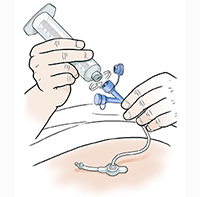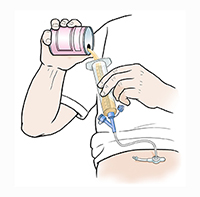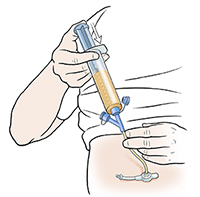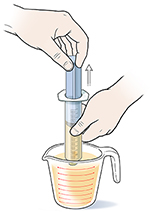Bolus Tube Feeding
People with feeding tubes who can tolerate a normal amount of food at one time can be fed by bolus feeding. Feedings are most often given every 4 to 6 hours during waking hours. You’ll be told how often to give the feedings and how much water to give between feedings. To start, wash your hands. Then open and use only the prescribed amount of liquid food (formula). Do not give unapproved food or liquid into the tube. They can clog or cause breakdown of the tube.
Bolus feeding is given by syringe into gastric (stomach) feeding tubes. If you have a small intestine (jejunal) feeding tube, you should not bolus feed. Always remember to give feeding while you are at a 30-degree angle upright or greater. Do not give when you are lying flat, because it can increase your risk of aspiration. (Aspiration means that the food comes back up from your stomach into your throat and windpipe.)
The syringe connects with the feeding tube by twisting together. This way, the food won't leak out when you push the syringe. You will also be told to flush your tube with water before and after feedings to prevent clogging. Follow your care team's instructions.
Twist-type safety syringe and feeding tube
|

|

|

|
|
Step 1. Twist the syringe tip onto the feeding tube.
-
Pull the plunger out of the syringe.
-
Remove the feeding tube's port cap.
-
Twist the syringe tip onto the feeding tube's safety port.
|
Step 2. Fill the syringe.
|
Step 3. Give the feeding.
-
Depending on your care team's instructions, put the plunger back into the syringe, then push down slowly on the plunger.
OR
-
Hold the syringe straight up and let the formula run through the tube by gravity.
|
Repeat steps 2 and 3
|
You can also fill the syringe from a measuring cup.
-
Leave the plunger in the syringe.
-
Pour the formula into the measuring cup.
-
Put the syringe tip into the cup. Pull up the plunger.
-
Then twist the syringe tip onto the feeding tube's safety port.
|

|
© 2000-2025 The StayWell Company, LLC. All rights reserved. This information is not intended as a substitute for professional medical care. Always follow your healthcare professional's instructions.